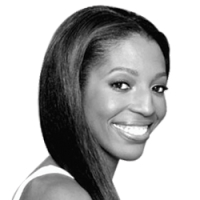For days, New York Times columnist Alessandra Stanley has been mired in controversy. The coverage generated by her recent piece on television powerhouse and Scandal creator Shonda Rhimes has officially disproved the age-old adage “all press is good press.” Stanley has inspired countless articles, blog posts and tweets that have accused her of being a sloppy journalist at best, a racist at worse. (Even her own publication, The New York Times, issued a stinging critique.) While the column offended different people for different reasons, most were upset with her opening line: “When Shonda Rhimes writes her autobiography, it should be called ‘How to Get Away With Being an Angry Black Woman.’ ”
When I finally got a chance to read the piece in question, I was somewhat surprised by the firestorm. Not because I didn’t understand how some might perceive Stanley’s words as offensive, but because I was surprised anyone else would be surprised that she wrote them. Many of Stanley’s most memorable pieces have followed a predictable formula: write about a powerful woman, but do so in an unflattering way that takes her down a peg. Rhimes just happens to be the latest target.
Stanley’s column about Katie Couric, which came out nearly a decade ago, was so brutal that it is still mentioned in media circles. Two years after it ran, New York Magazine wrote, “The Times has had some great moments in cattiness…But Alessandra Stanley's 2005 categorization of Katie Couric’s Today Show persona as ‘downright scary’ is one of the greats."
The magazine then went on to note Stanley’s dismissive comments in a later column about Couric’s successor, Meredith Vieira: “Ms. Vieira, who replaced Katie Couric more than a year ago, is pleasant but bland, and not forceful enough to dim the ascendance of Ms. Curry, who was passed over for the top co-host job but seems determined to play the role anyway.”
What makes her comments about Curry here particularly interesting is that, when she left The Today Show just a few years later, Stanley took a shot at her, too. “Ms. Curry turned to the camera and delivered a tearful farewell that was gallant and also embarrassingly maudlin and grandiose and that pretty much summed up why she got the hook after just one year in the host chair next to Matt Lauer,” Stanley wrote at the time.
Stanley then went on to praise Curry after slamming her, a technique she would later use in her Rhimes piece. But once someone says that, based on your performance, she understands why you just got the boot, it’s a little late to come back with compliments.
Then there was her column on the death of Charlie’s Angels icon Farrah Fawcett, which like the Rhimes column generated plenty of critical coverage. Here’s the opening line, from a piece published the day Fawcett died: “She really tried. And for a sex symbol that alone can be like an accomplishment.”
For the record, in addition to taking the culture by storm with her widely copied hairstyle, Fawcett was also nominated for many acting awards and helped bring domestic violence out of the shadows with her film The Burning Bed. Yet Stanley, while providing an overview of Fawcett’s career, still managed to dismiss her as little more than a pretty face.
The tone was tacky, but the timing—coming so soon after Fawcett’s death—just made it worse. Many commenters surmised that Stanley’s motivation had less to do with serious criticism of Fawcett’s career choices and more to do with her appearance. Perhaps, they wondered, Stanley was judging Fawcett by a harsher standard because she had been a beautiful woman; something plenty of women do to each other, though most who do are loath to admit it.
There are other examples, which you can read by perusing Stanley’s archive, but the Fawcett piece seems to perfectly capture Stanley’s best known style, which encapsulates what I like to call Elite-Mean-Girl Syndrome. It’s a syndrome in which women are mean to each other, but hide behind an allegedly valid excuse to get away with it. Just recently, Diane Ravitch criticized CNN journalist turned education advocate Campbell Brown by saying, “She is a good media figure because of her looks, but she doesn’t seem to know or understand anything about teaching and why tenure matters. ... I know it sounds sexist to say that she is pretty, but that makes her telegenic, even if what she has to say is total nonsense.”
Hmmm. That sounds a bit like someone being a sex symbol that “really tried.”
To be clear—I do not believe powerful, accomplished women are above reproach, and I have criticized my share. But the criticism should focus on their accomplishments and professional choices, not their appearance, and rarely their wardrobe choices. No profile of a male news personality would reference the sound of his shoes as some sort of sign he may be on his way out the door and that he may deserve the push. But Stanley wrote of Couric: “At the first sound of her peremptory voice and clickety stiletto heels, people dart behind doors and douse the lights.”
Couric may have eventually got her revenge when she referenced Stanley’s error-riddled piece on the passing of news legend Walter Cronkite live on air. Stanley’s Cronkite piece elicited a response from the Public Editor of The New York Times, just as her Rhimes column has.
Perhaps the question should not be if Stanley has a problem with black women, but if she has a problem with women who are more accomplished and powerful than she is—and, given her track record, whether she should be trusted with such a prominent platform in the first place.






